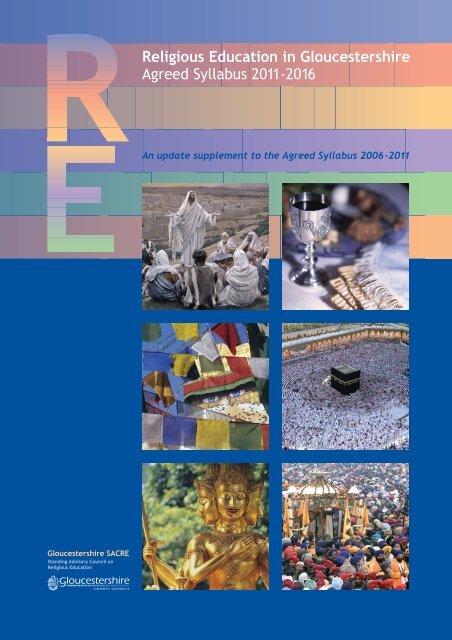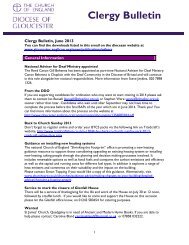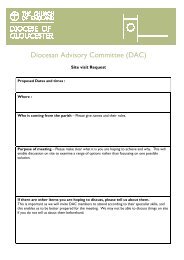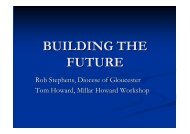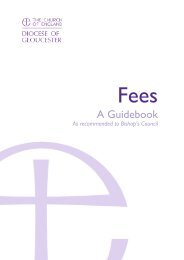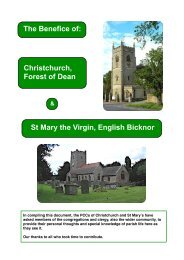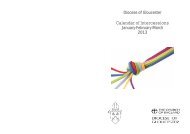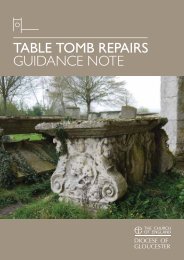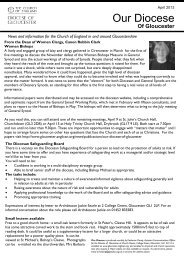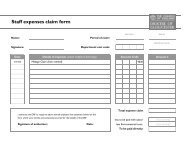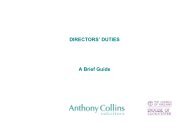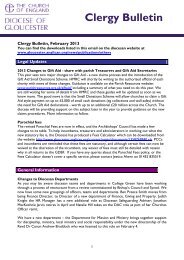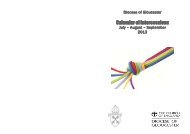Download the Revised RE Syllabus 2011 - Diocese of Gloucester
Download the Revised RE Syllabus 2011 - Diocese of Gloucester
Download the Revised RE Syllabus 2011 - Diocese of Gloucester
Create successful ePaper yourself
Turn your PDF publications into a flip-book with our unique Google optimized e-Paper software.
Religious Education in <strong>Gloucester</strong>shire<br />
Agreed <strong>Syllabus</strong> <strong>2011</strong>-2016<br />
An update supplement to <strong>the</strong> Agreed <strong>Syllabus</strong> 2006-<strong>2011</strong><br />
<strong>Gloucester</strong>shire SAC<strong>RE</strong><br />
Standing Advisory Council on<br />
Religious Education
Religious Education in<br />
<strong>Gloucester</strong>shire<br />
Agreed <strong>Syllabus</strong> <strong>2011</strong>-2016<br />
An update supplement to <strong>the</strong><br />
Agreed <strong>Syllabus</strong> 2006-<strong>2011</strong> first<br />
published in February 2006.<br />
Published by <strong>Gloucester</strong>shire SAC<strong>RE</strong><br />
Children and Young People’s Services<br />
<strong>Gloucester</strong>shire County Council<br />
For fur<strong>the</strong>r details contact:<br />
Liz Warwick<br />
<strong>Gloucester</strong>shire County Council<br />
Children and Young People’s Services<br />
Shire Hall<br />
Westgate Street<br />
<strong>Gloucester</strong> GL1 2TP<br />
Telephone: 01452 426418<br />
Email: liz.warwick@gloucestershire.gov.uk<br />
Copyright © <strong>2011</strong><br />
<strong>Gloucester</strong>shire County Council<br />
Designed and produced by<br />
Nicholas J Jones Graphics<br />
All rights reserved: No part <strong>of</strong> this publication may<br />
be reproduced or transmitted by any means,<br />
electronic, mechanical, photocopying, recording or<br />
o<strong>the</strong>rwise, without <strong>the</strong> prior and written permission<br />
<strong>of</strong> <strong>the</strong> publisher.<br />
<strong>Gloucester</strong>shire County Council/<strong>Gloucester</strong>shire<br />
SAC<strong>RE</strong> have asserted <strong>the</strong>ir moral rights.
Religious Education in <strong>Gloucester</strong>shire<br />
Agreed <strong>Syllabus</strong> <strong>2011</strong>-2016<br />
An update supplement to <strong>the</strong> Agreed <strong>Syllabus</strong> 2006-<strong>2011</strong><br />
Teaching<br />
and learning<br />
requirements<br />
Foundation<br />
Stage<br />
Key Stage 1<br />
Contents<br />
Foreword 2<br />
Preface 2<br />
Introduction 3<br />
Key features and changes in<br />
Agreed <strong>Syllabus</strong> <strong>2011</strong>-2016 3<br />
The aim <strong>of</strong> religious education 4<br />
The contribution <strong>of</strong> religious<br />
education to wider <strong>the</strong> curriculum<br />
and pupil development 5<br />
Amendments:<br />
Legal requirements for religious<br />
education in <strong>the</strong> curriculum 6<br />
Time for religious education 7<br />
Amendments to attainment targets 8<br />
To help locate <strong>the</strong> position <strong>of</strong> <strong>the</strong> revised<br />
and new material this update supplement<br />
employs <strong>the</strong> same page colour coding<br />
used in <strong>the</strong> original Agreed <strong>Syllabus</strong><br />
2006-<strong>2011</strong>.<br />
Key Stage 2<br />
Key Stage 3<br />
14-19<br />
A congregation <strong>of</strong> Anglican Christians<br />
attend <strong>the</strong> St. Bede’s School Service in<br />
<strong>the</strong> nave <strong>of</strong> Durham Ca<strong>the</strong>dral.<br />
Breadth <strong>of</strong> study 8<br />
Planning at Key Stage 1 9<br />
Planning at Key Stage 2 10<br />
Planning at Key Stage 3 11<br />
Guidance:<br />
Models <strong>of</strong> curriculum delivery 12<br />
Effective planning in <strong>RE</strong> Part 1:<br />
Using <strong>the</strong> syllabus key questions 14<br />
Planning process: Key Stage 1 15<br />
Planning process: Key Stage 2 16<br />
Planning process: Key Stage 3 17<br />
Effective planning in <strong>RE</strong> Part 2:<br />
Using your own key questions 18<br />
Planning process: Key Stage 1<br />
Devising your own key questions 19<br />
Planning process: Key Stage 2<br />
Devising your own key questions 20<br />
Planning process: Key Stage 3<br />
Devising your own key questions 21<br />
How to devise key questions 22<br />
A model for enquiry in religious<br />
education 23<br />
Islam at Key Stage 3 24<br />
Appendices on Schoolsnet:<br />
A. Developing skills in <strong>RE</strong><br />
B. Developing attitudes in <strong>RE</strong><br />
C. Approaches to teaching <strong>RE</strong><br />
D. <strong>RE</strong> and well-being<br />
E. <strong>RE</strong> and social cohesion<br />
1
Religious Education in <strong>Gloucester</strong>shire - Agreed <strong>Syllabus</strong> <strong>2011</strong>-2016<br />
Foreword<br />
Preface<br />
I am pleased to present this revision <strong>of</strong><br />
<strong>the</strong> <strong>Gloucester</strong>shire Agreed <strong>Syllabus</strong> for<br />
<strong>RE</strong>. In response to feedback from many<br />
teachers, SAC<strong>RE</strong> have decided to retain<br />
<strong>the</strong> syllabus from 2006-<strong>2011</strong> with some<br />
amendments. In a period <strong>of</strong> significant<br />
change in education, we think that this<br />
element <strong>of</strong> continuity will be good for<br />
religious education in <strong>Gloucester</strong>shire<br />
schools.<br />
The amendments included in this insert<br />
support <strong>the</strong> more flexible approach being<br />
taken by <strong>the</strong> syllabus for <strong>2011</strong>-2016. This<br />
approach allows for schools to develop<br />
units <strong>of</strong> <strong>RE</strong> that fit <strong>the</strong>ir context, in a way<br />
that takes <strong>the</strong> freedom <strong>of</strong> schools to<br />
develop <strong>the</strong>ir own curriculum seriously.<br />
The syllabus also <strong>of</strong>fers support for<br />
schools as <strong>the</strong>y plan for this. It does so<br />
by providing a clear planning structure<br />
that helps teachers to plan for quality<br />
religious education. The planning steps<br />
are designed to support subject leaders<br />
and teachers <strong>of</strong> <strong>RE</strong>, to increase <strong>the</strong>ir<br />
confidence in planning and delivering<br />
<strong>RE</strong>. The aim is to encourage teachers<br />
to use <strong>the</strong> syllabus to do good <strong>RE</strong>, whilst<br />
supporting <strong>the</strong>m to be more creative in<br />
<strong>the</strong>ir <strong>RE</strong>.<br />
On behalf <strong>of</strong> SAC<strong>RE</strong> I would like to thank<br />
all those teachers who took part in <strong>the</strong><br />
consultation and development <strong>of</strong> this<br />
revised syllabus, and members <strong>of</strong><br />
SAC<strong>RE</strong> and <strong>the</strong> Agreed <strong>Syllabus</strong><br />
Conference. I am confident that <strong>the</strong> result<br />
<strong>of</strong> <strong>the</strong>ir work will help to sustain and<br />
develop <strong>RE</strong> over <strong>the</strong> next five years in<br />
<strong>Gloucester</strong>shire schools. I wish to pass<br />
on my particular thanks to Stephen Pett,<br />
<strong>Gloucester</strong>shire’s pr<strong>of</strong>essional consultant,<br />
who has led <strong>the</strong> development <strong>of</strong> all<br />
aspects <strong>of</strong> this revision. His role has been<br />
critical. SAC<strong>RE</strong> is confident that we have<br />
a curriculum that not only meets <strong>the</strong><br />
needs <strong>of</strong> our children but <strong>of</strong> <strong>the</strong><br />
community as a whole.<br />
Ge<strong>of</strong> Roser<br />
Chair <strong>of</strong> SAC<strong>RE</strong><br />
Since its publication in 2006, <strong>the</strong><br />
<strong>Gloucester</strong>shire Agreed <strong>Syllabus</strong> has<br />
been widely acclaimed as a highly<br />
effective, creative and informative<br />
document which has supported<br />
innovation and rigour in <strong>RE</strong> teaching<br />
across <strong>the</strong> county’s schools. It has also<br />
been adopted by o<strong>the</strong>r local authorities.<br />
This revision streng<strong>the</strong>ns <strong>the</strong> existing<br />
syllabus and provides support for<br />
teachers who want to develop quality <strong>RE</strong><br />
within a flexible framework. Step by step<br />
guidance will help specialist and non<br />
specialist teachers alike.<br />
<strong>RE</strong> retains its core statutory role within<br />
<strong>the</strong> curriculum and recent ministerial<br />
announcements have underlined <strong>the</strong><br />
importance <strong>of</strong> <strong>the</strong> locally agreed syllabus.<br />
I am grateful to Stephen Pett and o<strong>the</strong>r<br />
colleagues who have contributed to this<br />
revision. I am proud <strong>of</strong> <strong>the</strong> expertise<br />
which exists across our schools in<br />
<strong>Gloucester</strong>shire and I know that this<br />
revision will add even fur<strong>the</strong>r to <strong>the</strong><br />
effectiveness <strong>of</strong> our Agreed <strong>Syllabus</strong>.<br />
Jo Grills<br />
Director <strong>of</strong> Learning and Development<br />
January <strong>2011</strong><br />
Ge<strong>of</strong> Roser<br />
Chair <strong>of</strong> SAC<strong>RE</strong><br />
Jo Grills<br />
Director <strong>of</strong><br />
Learning and<br />
Development<br />
2
Religious Education in <strong>Gloucester</strong>shire - Agreed <strong>Syllabus</strong> <strong>2011</strong>-2016<br />
Introduction<br />
A statue <strong>of</strong> <strong>the</strong> Lord Buddha.<br />
This publication updates and<br />
supplements <strong>the</strong> <strong>Gloucester</strong>shire<br />
Agreed <strong>Syllabus</strong> 2006-<strong>2011</strong>, and<br />
toge<strong>the</strong>r with that syllabus, comprises<br />
<strong>the</strong> <strong>Gloucester</strong>shire Agreed <strong>Syllabus</strong><br />
<strong>2011</strong>-2016. There are amendments to<br />
<strong>the</strong> 2006 <strong>Syllabus</strong> and additional<br />
guidance in order to help schools use<br />
<strong>the</strong> <strong>RE</strong> Agreed <strong>Syllabus</strong> more effectively.<br />
The key features <strong>of</strong> <strong>the</strong><br />
syllabus <strong>2011</strong>-2016 include:<br />
• clear programmes <strong>of</strong> study, linking<br />
core knowledge, skills and<br />
assessment;<br />
• levels <strong>of</strong> achievement to support<br />
progression;<br />
• flexibility to allow schools to develop<br />
quality <strong>RE</strong> that fits <strong>the</strong>ir context,<br />
whe<strong>the</strong>r discrete <strong>RE</strong> or making links<br />
with subject areas across <strong>the</strong> school.<br />
Additional features:<br />
• step by step guidance on effective<br />
planning for <strong>RE</strong>;<br />
• an enquiry process that can be used<br />
to underpin teaching and learning;<br />
• enhanced opportunities for studying<br />
Islam at KS3.<br />
The changes to <strong>the</strong> syllabus<br />
are as follows:<br />
• updated legal information including<br />
that applying to academies;<br />
• advice on <strong>the</strong> time for <strong>RE</strong>;<br />
• change <strong>of</strong> attainment targets to<br />
“learning about religion and belief” and<br />
“learning from religion and belief”;<br />
• <strong>the</strong> option for schools to develop <strong>the</strong>ir<br />
own key questions linked to <strong>the</strong> <strong>the</strong>mes<br />
in <strong>the</strong> syllabus, allowing links with o<strong>the</strong>r<br />
subject areas where appropriate.<br />
The revised syllabus is designed to<br />
support schools in planning <strong>the</strong>ir <strong>RE</strong>.<br />
The planning guidance helps teachers<br />
to make more effective use <strong>of</strong> <strong>the</strong><br />
syllabus by leading <strong>the</strong>m through <strong>the</strong><br />
process to develop focused, outcomeled<br />
units. These <strong>the</strong>n give <strong>the</strong> space for<br />
teachers to devise imaginative learning<br />
opportunities and enable <strong>the</strong>ir pupils to<br />
achieve <strong>the</strong> levelled outcomes.<br />
This supplement will fit inside <strong>the</strong><br />
2006-<strong>2011</strong> <strong>Syllabus</strong> folder.<br />
Additional guidance in <strong>the</strong> form <strong>of</strong><br />
appendices and exemplar units <strong>of</strong> work<br />
can be found on Schoolsnet<br />
http://www.gloucestershire.gov.uk/scho<br />
olsnet/index.cfmarticleid=21003<br />
Acknowledgements<br />
Thanks to <strong>the</strong> many excellent<br />
<strong>Gloucester</strong>shire teachers from all phases<br />
who participated in <strong>the</strong> consultation<br />
process and <strong>the</strong> trialling <strong>of</strong> <strong>the</strong> planning<br />
guidance.<br />
Thanks to members <strong>of</strong> SAC<strong>RE</strong> and <strong>the</strong><br />
Agreed <strong>Syllabus</strong> Conference, especially<br />
Ge<strong>of</strong> Roser, Ceri Jones, Shahne Vickery,<br />
Paul Newbould, David Crunkhurn,<br />
Debbie Glover and Debra Legge, who<br />
met regularly to scrutinise <strong>the</strong> drafts and<br />
advise on amendments.<br />
Thanks to Stephen Pett, <strong>RE</strong> Today<br />
Services, for leading and managing <strong>the</strong><br />
review process, and for writing and<br />
editing <strong>the</strong> <strong>2011</strong> insert.<br />
3
Religious Education in <strong>Gloucester</strong>shire - Agreed <strong>Syllabus</strong> <strong>2011</strong>-2016<br />
This page reinforces <strong>the</strong> Agreed <strong>Syllabus</strong> page 12<br />
The aim <strong>of</strong> religious education<br />
The principal aim <strong>of</strong> religious education<br />
in <strong>Gloucester</strong>shire is...<br />
...to engage pupils with questions arising<br />
from <strong>the</strong> study <strong>of</strong> religion and beliefs so as to<br />
promote <strong>the</strong>ir spiritual, moral, social and<br />
cultural development.<br />
This Agreed <strong>Syllabus</strong> sets <strong>the</strong><br />
standards expected for pupils’<br />
learning in religious education in<br />
<strong>Gloucester</strong>shire schools.<br />
It does this by:<br />
• identifying two attainment targets:<br />
AT1 Learning about religion and<br />
belief; and AT2 Learning from<br />
religion and belief;<br />
• identifying <strong>the</strong> knowledge, skills and<br />
understanding expected in each key<br />
stage;<br />
• using level descriptions to indicate<br />
<strong>the</strong> types and range <strong>of</strong> performance<br />
that pupils working at each level<br />
should characteristically<br />
demonstrate.<br />
To teach <strong>RE</strong> as intended by this<br />
syllabus, planning and teaching<br />
must reflect its aims, attainment<br />
targets, breadth <strong>of</strong> study and levelrelated<br />
learning outcomes.<br />
4
Religious Education in <strong>Gloucester</strong>shire - Agreed <strong>Syllabus</strong> <strong>2011</strong>-2016<br />
The contribution <strong>of</strong> religious education<br />
to <strong>the</strong> wider curriculum and pupil<br />
development<br />
<strong>RE</strong> plays a significant role in<br />
<strong>the</strong> personal development <strong>of</strong><br />
children and young people<br />
At its heart is <strong>the</strong> intention to<br />
enable children and young people<br />
to become “religiously educated”<br />
in order to face <strong>the</strong> demands <strong>of</strong><br />
<strong>the</strong> contemporary world.<br />
What might a “religiously<br />
educated person” be Some<br />
possible responses include<br />
someone who...<br />
• has a depth <strong>of</strong> understanding<br />
and insight into religion and<br />
belief, and <strong>the</strong>ir impact in <strong>the</strong><br />
lives <strong>of</strong> believers and society,<br />
including <strong>the</strong> implications for<br />
<strong>the</strong>ir own lives;<br />
• is confident and thoughtful<br />
about, and able to express, <strong>the</strong>ir<br />
own beliefs;<br />
• acts in accordance with <strong>the</strong>ir<br />
beliefs;<br />
• is interested in, and respectful<br />
towards, <strong>the</strong> beliefs <strong>of</strong> o<strong>the</strong>rs;<br />
• is interested in building up <strong>the</strong>ir<br />
understanding <strong>of</strong> different<br />
religions and beliefs;<br />
• is able to think for <strong>the</strong>mselves<br />
and recognise where o<strong>the</strong>rs<br />
may be trying to influence <strong>the</strong>m;<br />
• continues to explore <strong>the</strong><br />
questions <strong>of</strong> meaning that life<br />
throws up in light <strong>of</strong> <strong>the</strong> insights<br />
<strong>of</strong> faith.<br />
Given <strong>the</strong> opportunities for<br />
encountering people <strong>of</strong> different<br />
beliefs and lifestyles, <strong>RE</strong> also has<br />
a key role to play in fostering social<br />
cohesion. As well as being<br />
“religiously educated”, <strong>RE</strong> helps<br />
pupils to become “skilled cultural<br />
navigators”, able to handle <strong>the</strong><br />
differences <strong>of</strong> faith and belief around<br />
<strong>the</strong>m, as well as establish <strong>the</strong>ir own<br />
sense <strong>of</strong> identity and belonging.<br />
For ideas and examples <strong>of</strong> how <strong>RE</strong><br />
can promote social cohesion, see<br />
Appendix E on Schoolsnet.<br />
At <strong>the</strong> root <strong>of</strong> <strong>RE</strong>’s significant<br />
contribution to pupil development,<br />
are <strong>the</strong> specific skills and attitudes<br />
that are at <strong>the</strong> heart <strong>of</strong> <strong>the</strong> process<br />
<strong>of</strong> teaching and learning in this<br />
subject.<br />
In <strong>the</strong> process <strong>of</strong> exploring religion<br />
and belief, <strong>RE</strong> seeks to develop <strong>the</strong><br />
ability <strong>of</strong> pupils to:<br />
• Investigate<br />
• Interpret<br />
• Reflect<br />
• Evaluate<br />
• Empathise<br />
• Analyse<br />
• Syn<strong>the</strong>sise<br />
• Apply<br />
• Express<br />
• Discern<br />
<strong>RE</strong> encourages <strong>the</strong> development <strong>of</strong>:<br />
• Self-awareness<br />
• Respect for all<br />
• Open-mindedness<br />
• Appreciation and wonder<br />
For examples <strong>of</strong> how to develop<br />
<strong>the</strong>se skills and attitudes in <strong>RE</strong>, see<br />
Appendix A and B on Schoolsnet.<br />
<strong>RE</strong> plays an important part in<br />
promoting <strong>the</strong> spiritual, moral,<br />
social and cultural development<br />
<strong>of</strong> pupils, making a unique<br />
contribution to <strong>the</strong>ir spiritual<br />
development in particular.<br />
For a more detailed explanation <strong>of</strong><br />
<strong>the</strong>se terms, toge<strong>the</strong>r with ideas and<br />
examples about how <strong>RE</strong> gives<br />
opportunities for <strong>the</strong>ir development,<br />
see <strong>Syllabus</strong> page 20.<br />
Well-being can be interpreted in<br />
terms <strong>of</strong> healthy choices and<br />
lifestyles. However, <strong>RE</strong> opens <strong>the</strong><br />
possibility <strong>of</strong> exploring a deeper<br />
understanding <strong>of</strong> well-being,<br />
incorporating spiritual health, a<br />
fascination with <strong>the</strong> world and our<br />
place in it, and a resilience to <strong>the</strong><br />
hardships that life <strong>of</strong>ten brings.<br />
<strong>RE</strong>’s unique contribution comes from<br />
<strong>the</strong> rich resources <strong>of</strong> <strong>the</strong> world<br />
religions, whose leaders and<br />
followers have frequently responded<br />
to life and <strong>the</strong> world with wisdom<br />
and insight. Combined with <strong>the</strong><br />
insights from those who reject<br />
religious belief, this <strong>of</strong>fers students<br />
valuable perspectives to explore and<br />
evaluate when examining <strong>the</strong>ir own<br />
responses to life.<br />
For more on <strong>RE</strong>’s contribution to<br />
pupil well-being, see Appendix D on<br />
Schoolsnet.<br />
5
Religious Education in <strong>Gloucester</strong>shire - Agreed <strong>Syllabus</strong> <strong>2011</strong>-2016<br />
This page amends and adds to <strong>the</strong> information on page 10 in <strong>the</strong> Agreed <strong>Syllabus</strong><br />
Legal requirements for religious education<br />
in <strong>the</strong> curriculum<br />
Religious education must be taught<br />
to all registered pupils in maintained<br />
schools, including those in <strong>the</strong> sixth<br />
form, except to those withdrawn by<br />
<strong>the</strong>ir parents.<br />
This requirement does not apply to<br />
nursery classes in maintained schools.<br />
Religious Education should be provided<br />
for all registered pupils except for those<br />
withdrawn at <strong>the</strong> request <strong>of</strong> <strong>the</strong>ir parents.<br />
(s 71 SSFA 1998). This will include<br />
school children in Reception classes as<br />
well as Post 16 students (but not those<br />
at Sixth Form colleges). Special schools<br />
should comply as far as is practicable.<br />
The Education Act (2002 Section 80<br />
(1)(a); (2) (a) (b))<br />
<strong>RE</strong> and <strong>the</strong> National<br />
Curriculum<br />
Religious education is a component <strong>of</strong><br />
<strong>the</strong> basic curriculum, to be taught<br />
alongside <strong>the</strong> National Curriculum in all<br />
maintained schools.<br />
The curriculum for every maintained<br />
school in England shall comprise a basic<br />
curriculum which includes:<br />
a) provision for religious education for<br />
all registered pupils at <strong>the</strong> school (in<br />
accordance with such <strong>of</strong> <strong>the</strong> provisions<br />
<strong>of</strong> Schedule 19 to <strong>the</strong> School<br />
Standards and Framework Act 1998<br />
(c. 31) as apply in relation to <strong>the</strong><br />
school),<br />
b) a curriculum for all registered pupils<br />
at <strong>the</strong> school who have attained <strong>the</strong><br />
age <strong>of</strong> three but are not over<br />
compulsory school age (known as “<strong>the</strong><br />
National Curriculum for England”).<br />
Education Act 2002, s80<br />
Which schools must follow<br />
this agreed syllabus<br />
Religious education must be taught in<br />
accordance with <strong>the</strong> <strong>Gloucester</strong>shire<br />
agreed syllabus in all:<br />
• Community schools and<br />
• Foundation and Voluntary Controlled<br />
schools. (SSFA 1998 paras 2(1) and<br />
2(2) Schedule 19)<br />
For Voluntary Aided schools with a<br />
religious character, <strong>the</strong> <strong>RE</strong> <strong>of</strong>fered is to<br />
be determined by <strong>the</strong> governors in<br />
accordance with <strong>the</strong> trust deed. (SSFA<br />
1998 Schedule 19.4)<br />
This syllabus has been written in<br />
conjunction with <strong>the</strong> <strong>Diocese</strong> <strong>of</strong><br />
<strong>Gloucester</strong>, and is recommended to all<br />
Church <strong>of</strong> England VA schools.<br />
The Funding Agreements for new<br />
academies stipulate that all academies<br />
are required to teach <strong>RE</strong>.<br />
• For academies without a religious<br />
character, this will be <strong>the</strong> locally agreed<br />
syllabus.<br />
• For denominational academies with a<br />
religious character (Church <strong>of</strong> England<br />
or Roman Catholic – but also Muslim<br />
and most Jewish academies), this will<br />
be in line with <strong>the</strong> denominational<br />
syllabus (where <strong>the</strong>re is one).<br />
• For non-denominational (such as<br />
Christian) faith academies this can be<br />
ei<strong>the</strong>r <strong>of</strong> <strong>the</strong> above, depending on <strong>the</strong><br />
wishes <strong>of</strong> <strong>the</strong> sponsor and what is<br />
agreed by Ministers.<br />
DCSF Guidance on religious education<br />
in English Schools, 2010<br />
The model Funding Agreement for new<br />
academies (2010) follows this stipulation<br />
that <strong>RE</strong> should be taught in all schools,<br />
following a local agreed syllabus or<br />
denominational syllabus.<br />
Religions and <strong>the</strong> agreed<br />
syllabus<br />
An agreed syllabus should ‘reflect <strong>the</strong><br />
fact that <strong>the</strong> religious traditions in Great<br />
Britain are in <strong>the</strong> main Christian, while<br />
taking account <strong>of</strong> <strong>the</strong> teaching and<br />
practices <strong>of</strong> o<strong>the</strong>r principal religions<br />
represented in Great Britain.’ (s375 (3)<br />
Education Act 1996)<br />
An agreed syllabus ‘must not be designed<br />
to convert pupils, or to urge a particular<br />
religion or religious belief on pupils.’<br />
(Education Act 1996 s.376 (2))<br />
This syllabus maintains that teaching<br />
about religions and beliefs should be<br />
open, fair and balanced. It should<br />
promote mutual respect and<br />
understanding, whilst not undermining<br />
or ignoring <strong>the</strong> role <strong>of</strong> families and<br />
religious or belief organisations in<br />
transmitting values to successive<br />
generations. In Church <strong>of</strong> England VA<br />
schools, it will reflect and promote a<br />
Christian ethos and Christian values<br />
whilst allowing for <strong>the</strong> freedom <strong>of</strong> pupils<br />
to hold and express different beliefs.<br />
Sikh children take part in a candle-light<br />
vigil in India.<br />
6
Religious Education in <strong>Gloucester</strong>shire - Agreed <strong>Syllabus</strong> <strong>2011</strong>-2016<br />
This page amends <strong>the</strong> information in <strong>the</strong> Agreed <strong>Syllabus</strong> page 11<br />
Time for religious education<br />
Schools have a statutory responsibility<br />
to deliver religious education to all pupils,<br />
except those withdrawn by parents.<br />
Schools make <strong>the</strong>ir own decisions<br />
about dividing up curriculum time but<br />
<strong>the</strong>y must ensure that sufficient time<br />
is given in order to enable pupils to<br />
meet <strong>the</strong> expectations set out in this<br />
agreed syllabus, ensuring that <strong>the</strong><br />
curriculum is coherent and shows<br />
progression, particularly across<br />
transitions between key stages.<br />
There is no single correct way <strong>of</strong> making<br />
appropriate provision for <strong>RE</strong> as long as<br />
<strong>the</strong> outcomes are met. In order to deliver<br />
<strong>the</strong> aims and expected standards <strong>of</strong> <strong>the</strong><br />
syllabus effectively, <strong>the</strong> expectation is<br />
that <strong>the</strong>re is a minimum allocation <strong>of</strong> 5%<br />
<strong>of</strong> curriculum time for <strong>RE</strong>:<br />
• Foundation Stage 2:<br />
• Key Stage 1:<br />
• Key Stage 2:<br />
• Key Stage 3:<br />
• 14-16:<br />
• 16-19:<br />
36 hours per year.<br />
36 hours per year.<br />
45 hours per year.<br />
45 hours per year.<br />
40 hours per year (approx 5% <strong>of</strong> curriculum<br />
time for pupils not following a full GCSE course<br />
in Religious Studies).<br />
A minimum <strong>of</strong> 10 hours per year is needed for<br />
students not following an examination course<br />
in Religious Studies to meet <strong>the</strong> requirements<br />
<strong>of</strong> <strong>the</strong> Agreed <strong>Syllabus</strong>.<br />
Remember: Collective worship is not included in curricular time even though<br />
<strong>the</strong>re may be, at times, a strong connection between that and <strong>the</strong>mes dealt with<br />
in religious education.<br />
Important Notes<br />
• <strong>RE</strong> is a core subject <strong>of</strong> <strong>the</strong> curriculum<br />
for all pupils. The requirements <strong>of</strong> this<br />
Agreed <strong>Syllabus</strong> are not subject to <strong>the</strong><br />
flexibility <strong>of</strong> <strong>the</strong> Foundation Subjects.<br />
• 36 hours per year is <strong>the</strong> equivalent <strong>of</strong><br />
one hour per week. This does not<br />
mean that <strong>RE</strong> must be delivered in<br />
weekly lessons. For models <strong>of</strong><br />
curriculum provision, see supplement<br />
pages 12-13.<br />
• There is clearly a common frontier<br />
between <strong>RE</strong> and such subjects as<br />
literacy, Citizenship or PSHE, however<br />
<strong>the</strong> times given above are explicitly for<br />
<strong>the</strong> clearly identifiable teaching <strong>of</strong> <strong>RE</strong>.<br />
• <strong>RE</strong> is an entitlement for all pupils<br />
through <strong>the</strong>ir secondary schooling. For<br />
schools <strong>of</strong>fering GCSE short course<br />
<strong>RE</strong> in Y9 and Y10, <strong>the</strong>re is still a<br />
requirement that <strong>the</strong>re is identifiable<br />
religious education in Y11.<br />
• Any school in which head teachers<br />
and governors do not plan to allocate<br />
sufficient curriculum time for <strong>RE</strong> is<br />
unlikely to enable pupils to achieve <strong>the</strong><br />
standards set out in this syllabus.<br />
Right <strong>of</strong> Withdrawal<br />
Parents have <strong>the</strong> right to request that<br />
<strong>the</strong>ir son or daughter be excused from<br />
all or part <strong>of</strong> <strong>the</strong> <strong>RE</strong> provided at <strong>the</strong>ir<br />
school. Parents have <strong>the</strong> right to do this<br />
without influence from <strong>the</strong> school,<br />
although a school should ensure that<br />
parents are aware <strong>of</strong> <strong>the</strong> educational<br />
objectives and content <strong>of</strong> <strong>the</strong> <strong>RE</strong> syllabus<br />
and that much has changed in <strong>RE</strong> since<br />
<strong>the</strong> right <strong>of</strong> withdrawal was enshrined in<br />
law. The emphasis in <strong>RE</strong> is on <strong>the</strong> open<br />
exploration <strong>of</strong> ultimate questions and <strong>the</strong><br />
examination <strong>of</strong> a range <strong>of</strong> religious and<br />
non-religious responses to <strong>the</strong>se<br />
questions, including <strong>the</strong> views <strong>of</strong> pupils.<br />
Parents should also recognise that pupils<br />
may encounter religion and belief in o<strong>the</strong>r<br />
parts <strong>of</strong> <strong>the</strong> curriculum from which <strong>the</strong>re<br />
is no right <strong>of</strong> withdrawal. Every school<br />
has a duty to promote social cohesion<br />
and this includes helping pupils<br />
understand ideas about identity and<br />
diversity, including within a religious<br />
context and a context <strong>of</strong> non-religious<br />
beliefs.<br />
Where parents do withdraw <strong>the</strong>ir child<br />
from <strong>RE</strong>, <strong>the</strong> law provides for alternative<br />
arrangements to be made for <strong>RE</strong> <strong>of</strong> <strong>the</strong><br />
kind <strong>the</strong> parent wishes <strong>the</strong> pupil to<br />
receive. More details are available in <strong>the</strong><br />
DCSF Non-statutory Guidance (2010,<br />
page 27-29). A copy <strong>of</strong> this is available<br />
on <strong>Gloucester</strong>shire Schoolsnet.<br />
Hindu Girl with flower <strong>of</strong>ferings.<br />
7
Religious Education in <strong>Gloucester</strong>shire - Agreed <strong>Syllabus</strong> <strong>2011</strong>-2016<br />
This amends pages 12, 14 and throughout <strong>the</strong> Agreed <strong>Syllabus</strong><br />
Amendment to attainment targets<br />
Breadth <strong>of</strong> Study<br />
The attainment targets for this syllabus<br />
should be taken as amended in <strong>the</strong><br />
following way throughout:<br />
AT1 Learning about religion and<br />
belief<br />
AT2 Learning from religion and<br />
belief<br />
This follows <strong>the</strong> move over <strong>the</strong> last few<br />
years towards acknowledging <strong>the</strong> place<br />
<strong>of</strong> non-religious worldviews within <strong>RE</strong>.<br />
The 2006 syllabus already does this, but<br />
<strong>the</strong> broadening <strong>of</strong> <strong>the</strong> attainment targets<br />
signals more clearly <strong>the</strong> need to take <strong>the</strong><br />
worldviews <strong>of</strong> pupils seriously within <strong>RE</strong><br />
lessons, as well as <strong>the</strong> opportunity for<br />
using non-religious beliefs as part <strong>of</strong><br />
teaching and learning, especially at KS3<br />
and 14-19.<br />
The religions to be studied remain <strong>the</strong><br />
same as <strong>the</strong> 2006 syllabus, with <strong>the</strong><br />
exception <strong>of</strong> emphasising <strong>the</strong> need to<br />
study Islam at KS3. See supplement<br />
pages 24-25.<br />
8
Religious Education in <strong>Gloucester</strong>shire - Agreed <strong>Syllabus</strong> <strong>2011</strong>-2016<br />
This page adds to <strong>the</strong> Key Stage 1 information in <strong>the</strong> Agreed <strong>Syllabus</strong> page 59<br />
Planning at Key Stage 1<br />
The <strong>RE</strong> <strong>the</strong>mes may also be used within<br />
a cross-curriculum context. Where this<br />
is <strong>the</strong> case it is important that teachers<br />
• always start from <strong>the</strong> intended <strong>RE</strong><br />
outcomes required by this agreed<br />
syllabus;<br />
• identify strong links between <strong>RE</strong> and<br />
o<strong>the</strong>r areas <strong>of</strong> learning identified in <strong>the</strong><br />
cross-curriculum <strong>the</strong>mes. The best<br />
cross-curriculum planning links<br />
subjects only where connections are<br />
strong;<br />
• discern if <strong>the</strong> <strong>RE</strong> links are weak or<br />
tentative – if so, <strong>the</strong> <strong>RE</strong> should be<br />
taught separately;<br />
• ensure rigour is planned into <strong>the</strong> <strong>RE</strong><br />
learning within <strong>the</strong> cross-curriculum<br />
<strong>the</strong>me by making sure that learning<br />
enables pupils to achieve <strong>the</strong> outcomes<br />
identified in <strong>the</strong> syllabus;<br />
• ensure progression within <strong>RE</strong> is secure<br />
within <strong>the</strong> long-term planning at each<br />
key stage.<br />
When planning how <strong>the</strong> units will be<br />
delivered across <strong>the</strong> key stage, whe<strong>the</strong>r<br />
in discrete <strong>RE</strong> or linked with o<strong>the</strong>r<br />
curriculum areas, it is important to ensure<br />
that:<br />
• both attainment targets are met<br />
throughout;<br />
• children are enabled to develop a<br />
coherent understanding <strong>of</strong> each<br />
religion and that more time is spent on<br />
Christianity overall;<br />
• units are arranged to ensure continuity<br />
and progression in children’s learning<br />
within <strong>the</strong> key stage.<br />
For a step by step guide to<br />
planning <strong>RE</strong> at Key Stage 1,<br />
see supplement page 15.<br />
Time for <strong>RE</strong> in Key Stage 1<br />
Sufficient time must be provided for <strong>RE</strong><br />
in KS1 to enable <strong>the</strong> requirements <strong>of</strong> <strong>the</strong><br />
Agreed <strong>Syllabus</strong> to be met, with particular<br />
regard for continuity and progression.<br />
A minimum <strong>of</strong> 36 hours a year is<br />
recommended, ensuring that across <strong>the</strong><br />
key stage <strong>the</strong> majority <strong>of</strong> this time is<br />
spent on Christianity. Some units are<br />
better taught in a block <strong>of</strong> time over a<br />
period <strong>of</strong> two or three weeks. O<strong>the</strong>rs are<br />
best dealt with by allocating a specific<br />
time over a longer period. Some areas<br />
<strong>of</strong> <strong>RE</strong> may be planned as a shared focus<br />
with o<strong>the</strong>r curriculum areas. O<strong>the</strong>rs may<br />
be taught in response to questions raised<br />
by children.<br />
For models <strong>of</strong> curriculum delivery, see<br />
supplement pages 12-13.<br />
A multi-faith assembly at school.<br />
Hindu pilgrims pray at <strong>the</strong> Ganga Sagar<br />
Mela festival in <strong>the</strong> Bay <strong>of</strong> Bengal, India.<br />
9
Religious Education in <strong>Gloucester</strong>shire - Agreed <strong>Syllabus</strong> <strong>2011</strong>-2016<br />
This page adds to <strong>the</strong> Key Stage 2 information in <strong>the</strong> Agreed <strong>Syllabus</strong> page 71<br />
Planning at Key Stage 2<br />
Within discrete <strong>RE</strong> lessons, <strong>the</strong>mes may<br />
be taught both systematically, exploring<br />
a single religion, and <strong>the</strong>matically, linking<br />
two or more religions.<br />
The <strong>RE</strong> <strong>the</strong>mes may also be used within<br />
a cross-curriculum context. Where this<br />
is <strong>the</strong> case it is important that teachers:<br />
• always start from <strong>the</strong> intended <strong>RE</strong><br />
outcomes required by this agreed<br />
syllabus;<br />
• identify strong links between <strong>RE</strong> and<br />
o<strong>the</strong>r areas <strong>of</strong> learning identified in <strong>the</strong><br />
cross-curriculum <strong>the</strong>me. The best<br />
cross-curriculum planning links<br />
subjects only where connections are<br />
strong;<br />
• discern if <strong>the</strong> <strong>RE</strong> links are weak or<br />
tentative – if so, <strong>the</strong> <strong>RE</strong> should be<br />
taught separately;<br />
• ensure rigour is planned into <strong>the</strong> <strong>RE</strong><br />
learning within <strong>the</strong> cross-curriculum<br />
<strong>the</strong>me by making sure that learning<br />
enables pupils to achieve <strong>the</strong> outcomes<br />
identified in <strong>the</strong> syllabus;<br />
• ensure progression within <strong>RE</strong> is secure<br />
within <strong>the</strong> long-term planning at each<br />
key stage.<br />
When planning how <strong>the</strong> units will be<br />
delivered across <strong>the</strong> key stage, whe<strong>the</strong>r<br />
in discrete <strong>RE</strong> or linked with o<strong>the</strong>r<br />
curriculum areas, it is important to<br />
ensure that:<br />
• both attainment targets are met<br />
throughout;<br />
• pupils are enabled to develop a<br />
coherent understanding <strong>of</strong> each<br />
religion and that more time is spent on<br />
Christianity overall;<br />
• units are arranged to ensure continuity<br />
and progression in pupils’ learning<br />
within <strong>the</strong> key stage.<br />
For a step by step guide to<br />
planning <strong>RE</strong> at Key Stage 2,<br />
see supplement page 16.<br />
Time for <strong>RE</strong> in Key Stage 2<br />
Sufficient time must be provided for <strong>RE</strong><br />
in KS2 to enable <strong>the</strong> requirements <strong>of</strong> <strong>the</strong><br />
Agreed <strong>Syllabus</strong> to be met, with particular<br />
regard for continuity and progression.<br />
A minimum time <strong>of</strong> 45 hours a year is<br />
recommended, ensuring that across <strong>the</strong><br />
key stage <strong>the</strong> majority <strong>of</strong> this time is<br />
spent on Christianity. You may plan to<br />
deliver <strong>RE</strong> in a variety <strong>of</strong> ways. For<br />
example, some units are best taught in<br />
weekly lessons over a term; o<strong>the</strong>rs could<br />
be in a block <strong>of</strong> time over several weeks.<br />
Some areas <strong>of</strong> <strong>RE</strong> may be planned as<br />
a shared focus with o<strong>the</strong>r curriculum<br />
areas. This could be through weekly<br />
lessons, or using a full day every few<br />
weeks, or having a week focused on <strong>RE</strong>,<br />
leading a cross-curriculum project.<br />
For models <strong>of</strong> curriculum delivery, see<br />
supplement pages 12-13.<br />
Young Buddhist monks taking break from<br />
studies, Bhutan.<br />
Muslim schoolgirls in Bradford.<br />
10
Religious Education in <strong>Gloucester</strong>shire - Agreed <strong>Syllabus</strong> <strong>2011</strong>-2016<br />
This page adds to <strong>the</strong> Key Stage 3 information in <strong>the</strong> Agreed <strong>Syllabus</strong> page 88<br />
Planning at Key Stage 3<br />
Within discrete <strong>RE</strong> lessons, <strong>the</strong>mes may<br />
be taught both systematically, exploring<br />
a single religion, and <strong>the</strong>matically, linking<br />
two or more religions.<br />
The <strong>RE</strong> <strong>the</strong>mes may also be used within<br />
a cross-curriculum context. Where this<br />
is <strong>the</strong> case it is important that teachers<br />
• always start from <strong>the</strong> intended <strong>RE</strong><br />
outcomes required by this agreed<br />
syllabus;<br />
• identify strong links between <strong>RE</strong> and<br />
o<strong>the</strong>r areas <strong>of</strong> learning identified in <strong>the</strong><br />
cross-curriculum <strong>the</strong>me. The best<br />
cross-curriculum planning links<br />
subjects only where connections are<br />
strong;<br />
• discern if <strong>the</strong> <strong>RE</strong> links are weak or<br />
tentative – if so, <strong>the</strong> <strong>RE</strong> should be<br />
taught separately;<br />
• ensure rigour is planned into <strong>the</strong> <strong>RE</strong><br />
learning within <strong>the</strong> cross-curriculum<br />
<strong>the</strong>me by making sure that learning<br />
enables students to achieve <strong>the</strong><br />
outcomes identified in <strong>the</strong> syllabus;<br />
• ensure progression within <strong>RE</strong> is secure<br />
within <strong>the</strong> long-term planning at each<br />
key stage.<br />
When planning how <strong>the</strong> units will be<br />
delivered across <strong>the</strong> key stage, whe<strong>the</strong>r<br />
in discrete <strong>RE</strong> or linked with o<strong>the</strong>r<br />
curriculum areas, it is important to ensure<br />
that:<br />
• both attainment targets are met<br />
throughout;<br />
• students are enabled to develop a<br />
coherent understanding <strong>of</strong> each<br />
religion and that more time is spent on<br />
Christianity overall;<br />
• units are arranged to ensure continuity<br />
and progression in students’ learning<br />
within <strong>the</strong> key stage.<br />
In planning, teachers should focus on<br />
designing teaching units that engage<br />
students through a range <strong>of</strong> strategies<br />
appropriate to different learning<br />
needs. The exploration <strong>of</strong> key<br />
questions and key concepts requires<br />
a wide range <strong>of</strong> skills. It is essential<br />
that <strong>the</strong> teaching is planned to ensure<br />
that <strong>the</strong> students achieve <strong>the</strong><br />
outcomes identified in <strong>the</strong> syllabus.<br />
For a step by step guide to<br />
planning <strong>RE</strong> at Key Stage 3,<br />
see supplement page 17.<br />
Time for <strong>RE</strong> at Key Stage 3<br />
Sufficient time must be provided for <strong>RE</strong><br />
in KS3 to enable <strong>the</strong> requirements <strong>of</strong> <strong>the</strong><br />
Agreed <strong>Syllabus</strong> to be met, with particular<br />
regard for continuity and progression.<br />
A minimum <strong>of</strong> 45 hours a year is<br />
recommended, ensuring that across <strong>the</strong><br />
key stage <strong>the</strong> majority <strong>of</strong> this time is<br />
spent on Christianity.<br />
<strong>RE</strong> can be delivered in a variety <strong>of</strong> ways.<br />
In most schools units will be delivered<br />
through discrete weekly lessons. At times<br />
<strong>the</strong>re may be <strong>the</strong> opportunity to have<br />
more concentrated blocks <strong>of</strong> time over<br />
a period <strong>of</strong> two or three weeks, or making<br />
use <strong>of</strong> day conferences. Some areas <strong>of</strong><br />
<strong>RE</strong> may be planned as a shared focus<br />
with o<strong>the</strong>r curriculum areas. Whichever<br />
model or combination <strong>of</strong> models is used,<br />
provision must ensure that:<br />
• continuity and progression can be<br />
maintained, and<br />
• students’ progress and achievements<br />
are assessed formatively as well as<br />
summatively.<br />
Faith healing in a British church.<br />
11
Religious Education in <strong>Gloucester</strong>shire - Agreed <strong>Syllabus</strong> <strong>2011</strong>-2016<br />
Models <strong>of</strong> curriculum delivery<br />
This syllabus allows flexibility in <strong>RE</strong><br />
provision and it is for schools to<br />
decide how <strong>RE</strong> should be delivered,<br />
ensuring that <strong>the</strong>re is continuity and<br />
progression in learning across key<br />
stages, and that annual reports <strong>of</strong><br />
pupils’ progress can be provided.<br />
Primary schools will have different<br />
approaches to meet different<br />
requirements. They may use <strong>the</strong> following<br />
approaches or a combination <strong>of</strong> <strong>the</strong>m:<br />
• teaching <strong>RE</strong> as a separate subject<br />
ei<strong>the</strong>r timetabled on a weekly basis or<br />
delivered in blocks <strong>of</strong> time at different<br />
points in <strong>the</strong> school year (ensuring <strong>the</strong><br />
requirements <strong>of</strong> <strong>the</strong> Agreed <strong>Syllabus</strong><br />
are met);<br />
• teaching <strong>RE</strong> within whole-school topics<br />
which bring toge<strong>the</strong>r a number <strong>of</strong><br />
subject areas. (Note: if this approach<br />
is followed it is essential that <strong>RE</strong> is<br />
planned to meet <strong>the</strong> objectives <strong>of</strong> <strong>the</strong><br />
Agreed <strong>Syllabus</strong>);<br />
• teaching some religions separately;<br />
• teaching <strong>RE</strong> units <strong>the</strong>matically i.e.<br />
teaching units which draw on more<br />
than one religion to explore a religious<br />
concept such as sacred books, worship<br />
or life as journey;<br />
• organising a rolling programme <strong>of</strong> study<br />
units, in order to meet <strong>the</strong> needs <strong>of</strong><br />
schools with mixed-age classes, with<br />
units planned so that <strong>the</strong> pitch and<br />
expectations for each unit are matched<br />
to <strong>the</strong> different ages and abilities within<br />
<strong>the</strong> class. (For example a mixed year<br />
3 and 4 class may be taught a<br />
sequence <strong>of</strong> <strong>RE</strong> units over a two year<br />
cycle, year A and year B, ensuring<br />
learning outcomes and activities are<br />
carefully planned to meet pupils’<br />
different ages and abilities);<br />
• using a spiral curriculum in which <strong>the</strong><br />
same <strong>RE</strong> unit is taught across all<br />
classes, ages and abilities at a given<br />
time, planned so that pitch and<br />
expectations are matched to different<br />
ages and abilities across <strong>the</strong> key stage.<br />
Planning to ensure<br />
continuity and progression<br />
Continuity can be achieved if planning<br />
starts from <strong>the</strong> Agreed <strong>Syllabus</strong> and<br />
careful attention is paid to what has been<br />
taught before and what is likely to follow.<br />
Progression is <strong>the</strong> development <strong>of</strong><br />
knowledge and understanding, skills,<br />
concepts and attitudes in a key stage<br />
and in relation to previous and<br />
subsequent key stages. It is achieved<br />
through building on earlier learning. It is<br />
not just about accumulation <strong>of</strong> knowledge<br />
but concerns a developing ability to<br />
deepen understanding by making use <strong>of</strong><br />
reflective, interpretative and evaluative<br />
skills. Pupils should increasingly be<br />
challenged to discover <strong>the</strong> underlying<br />
messages <strong>of</strong> <strong>the</strong> teaching behind<br />
religious traditions, stories, artefacts and<br />
ceremonies.<br />
Progression is characterised by <strong>the</strong><br />
provision <strong>of</strong> opportunities for pupils to:<br />
• extend <strong>the</strong>ir knowledge and<br />
understanding <strong>of</strong> religions and beliefs;<br />
• extend <strong>the</strong>ir ability to use religious<br />
vocabulary and interpret religious<br />
symbolism in a variety <strong>of</strong> forms;<br />
• deepen <strong>the</strong>ir reflection on questions<br />
<strong>of</strong> meaning, <strong>of</strong>fering <strong>the</strong>ir own<br />
thoughtful and informed insights into<br />
religious and non-religious views <strong>of</strong><br />
life’s meaning and purpose;<br />
• explore fundamental questions <strong>of</strong><br />
beliefs and values in relation to a range<br />
<strong>of</strong> contemporary issues.<br />
Continuity and progression can be<br />
achieved when pupils have increasingly<br />
challenging opportunities to:<br />
• appreciate <strong>the</strong> importance <strong>of</strong> religion<br />
in <strong>the</strong> lives <strong>of</strong> many people;<br />
• grow in understanding <strong>of</strong> <strong>the</strong> influence<br />
<strong>of</strong> belief on behaviour, values and<br />
attitudes;<br />
• consider <strong>the</strong>ir own beliefs, values and<br />
attitudes;<br />
• consider religious perspectives on<br />
contemporary social and moral issues.<br />
12
Religious Education in <strong>Gloucester</strong>shire - Agreed <strong>Syllabus</strong> <strong>2011</strong>-2016<br />
The following case studies give a picture <strong>of</strong> <strong>the</strong><br />
diverse ways in which <strong>RE</strong> can be delivered in<br />
primary schools:<br />
School A: <strong>RE</strong> as lead subject<br />
<strong>RE</strong> is an essential part <strong>of</strong> <strong>the</strong> creative teaching strategy<br />
at School A. They plan <strong>RE</strong> as <strong>the</strong> lead subject for some<br />
<strong>of</strong> <strong>the</strong>ir cross-curriculum units and twice a year hold two<br />
whole-school <strong>RE</strong> days, on a rolling two year programme.<br />
<strong>RE</strong> is <strong>the</strong> lead subject in units on KS1 <strong>the</strong>mes <strong>of</strong> Believing<br />
and Belonging. As a school with children <strong>of</strong> many different<br />
faiths it is important to show religion as part <strong>of</strong> life.<br />
One whole-school <strong>RE</strong> day aimed to make a study <strong>of</strong><br />
inspirational people whose beliefs have made a difference.<br />
Following a whole-school assembly in which teachers<br />
spoke about people who had inspired and influenced<br />
<strong>the</strong>m, children looked at <strong>the</strong> lives <strong>of</strong> people from a variety<br />
<strong>of</strong> faiths whose beliefs had led <strong>the</strong>m to make a difference.<br />
The day concluded with a reflection on what children<br />
might do, inspired by <strong>the</strong>ir person study, e.g. make a<br />
collection for a children’s hospice after looking at <strong>the</strong> work<br />
<strong>of</strong> Sister Frances Dominica.<br />
School B: Linking <strong>RE</strong> and art<br />
Following an <strong>RE</strong> unit <strong>of</strong> work on ‘Who was Jesus and<br />
why do people follow him’ KS2 pupils unpacked <strong>the</strong>ir<br />
understanding and questions through <strong>the</strong> arts. Working<br />
in pairs or individually, <strong>the</strong>y chose an artistic medium<br />
through which to express <strong>the</strong> complexity <strong>of</strong> <strong>the</strong>ir thoughts.<br />
These media included clay, 3-D models, 2-D collage,<br />
paint, dance, drama and music.<br />
One child created a cube with a ‘light’ inside symbolising<br />
Jesus and each ‘face’ represented a different way people<br />
have <strong>of</strong> perceiving this religious leader. Some faces had<br />
windows into <strong>the</strong> light and some didn’t. A collapsed papiermache<br />
model <strong>of</strong> <strong>the</strong> world with a cross above it represented<br />
a child’s understanding <strong>of</strong> salvation and resurrection.<br />
Ano<strong>the</strong>r model <strong>of</strong> barbed wire and light images was entitled<br />
‘The Pain and <strong>the</strong> Glory’.<br />
The school has seized o<strong>the</strong>r <strong>RE</strong> and Art opportunities as<br />
a pr<strong>of</strong>ound way <strong>of</strong> capturing children’s understanding and<br />
ideas. They are excellent assessment opportunities as<br />
<strong>the</strong>y bring toge<strong>the</strong>r <strong>the</strong> child’s learning about and learning<br />
from a particular <strong>the</strong>me.<br />
School C: Exploring World War II<br />
As part <strong>of</strong> a cross curricular unit on <strong>the</strong> Second World War,<br />
Yr 6 children explored <strong>the</strong> questions <strong>of</strong> ‘What does it mean<br />
to be Jewish’ and ‘Do religious beliefs help people<br />
survive in times <strong>of</strong> suffering’<br />
The teacher describes <strong>the</strong> thinking behind <strong>the</strong> unit: ‘This<br />
year I decided that <strong>RE</strong> should move into <strong>the</strong> centre ground<br />
taking a rightful place alongside history and literacy in <strong>the</strong><br />
<strong>the</strong>me exploring <strong>the</strong> Second World War, with all three<br />
subjects contributing skills and knowledge. The <strong>RE</strong> focus<br />
is on Judaism; <strong>the</strong> key concept is identity.<br />
‘Alongside learning about Jewish beliefs and community<br />
as part <strong>of</strong> our <strong>the</strong>me, our Y6 also reflected on <strong>the</strong>ir own<br />
identity and <strong>the</strong>ir own place in society.’<br />
In History pupils say that <strong>the</strong>y:<br />
• discovered how and why <strong>the</strong> war began. We learnt about<br />
evacuation and how children experienced going away<br />
from home. We leant about <strong>the</strong> Blitz, what happened<br />
and how people tried to keep safe from <strong>the</strong> bombing raids.<br />
In <strong>RE</strong> pupils say that <strong>the</strong>y:<br />
• read what a Jewish boy called Samuel believed was<br />
important in his life today, what his special times were<br />
and what he might change about his life. We thought<br />
about and made comparisons with our own lives too;<br />
• did some role-play about <strong>the</strong> events in <strong>the</strong> Exodus to<br />
show how God would care for <strong>the</strong>m in times <strong>of</strong> trouble;<br />
• had small group and class discussions about Jews and<br />
<strong>the</strong>ir experiences <strong>of</strong> <strong>the</strong> Holocaust. We talked about <strong>the</strong><br />
ways <strong>the</strong>y tried to continue <strong>the</strong>ir traditions such as trying<br />
to use margarine rations to light <strong>the</strong> menorah in <strong>the</strong> labour<br />
camp. This was Rabbi Hugo Gryn’s story;<br />
• imagined what it must be like to be persecuted, and<br />
thought how strong <strong>the</strong> Jews must have been to cope<br />
with <strong>the</strong> torture.<br />
In Literacy, pupils say that <strong>the</strong>y:<br />
• read poetry from <strong>the</strong> young people who were held in <strong>the</strong><br />
Terezin ghetto;<br />
• noticed <strong>the</strong>y used metaphors and imagery with powerful<br />
vocabulary to create a picture <strong>of</strong> <strong>the</strong>ir feelings. We tried<br />
to think about how abstract nouns, such as happiness,<br />
despair, hope and fear, might look as a metaphor, and<br />
used poetry techniques such as similes, kennings and<br />
alliteration to produce our own poems on <strong>the</strong> <strong>the</strong>me <strong>of</strong><br />
‘Hope’.<br />
13
Religious Education in <strong>Gloucester</strong>shire - Agreed <strong>Syllabus</strong> <strong>2011</strong>-2016<br />
Effective planning for <strong>RE</strong> Part 1:<br />
Using <strong>the</strong> syllabus key questions<br />
How to plan your <strong>RE</strong><br />
“In planning teachers will need to identify<br />
which parts <strong>of</strong> <strong>the</strong> programme <strong>of</strong> study<br />
are drawn toge<strong>the</strong>r to make coherent,<br />
manageable teaching units which will<br />
enable pupils to achieve <strong>the</strong> intended<br />
learning outcomes identified in <strong>the</strong><br />
syllabus”, from <strong>the</strong> Agreed <strong>Syllabus</strong><br />
page 8.<br />
Remember <strong>the</strong> principal aim for <strong>RE</strong> in<br />
<strong>Gloucester</strong>shire:<br />
...to engage pupils with questions<br />
arising from <strong>the</strong> study <strong>of</strong> religion and<br />
beliefs so as to promote <strong>the</strong>ir spiritual,<br />
moral, social and cultural<br />
development.<br />
The grid below outlines <strong>the</strong> processes<br />
that need to be part <strong>of</strong> planning good <strong>RE</strong><br />
in <strong>the</strong> medium to short term. Use <strong>the</strong><br />
planning process on <strong>the</strong> next pages to<br />
help you plan your <strong>RE</strong>. You will find<br />
worked examples <strong>of</strong> this process on <strong>the</strong><br />
Schoolsnet website.<br />
Theme<br />
Key<br />
question<br />
Outcomes<br />
Select<br />
content<br />
Levelled pupil<br />
outcomes<br />
(AT1 & 2)<br />
Teaching<br />
and learning<br />
activities<br />
This <strong>the</strong>me...<br />
...raises this<br />
important<br />
question:<br />
The Agreed<br />
<strong>Syllabus</strong> gives<br />
some learning<br />
outcomes our<br />
pupils should<br />
achieve through<br />
exploring this<br />
question:<br />
So we’ve<br />
selected this<br />
material to<br />
address <strong>the</strong><br />
question:<br />
Specifically, we<br />
want <strong>the</strong>m to be<br />
able to...<br />
...so that <strong>the</strong>y can<br />
say “I can... do X”<br />
(Use <strong>the</strong> skills<br />
highlighted in <strong>the</strong><br />
levels:<br />
understand<br />
make links<br />
ask questions<br />
explain<br />
apply<br />
reflect<br />
interpret<br />
analyse<br />
syn<strong>the</strong>sise<br />
discern<br />
evaluate etc.)<br />
This is how we<br />
are going to<br />
enable our pupils<br />
to develop <strong>the</strong><br />
identified skills –<br />
using some<br />
engaging stimuli<br />
and some active<br />
and thoughtful<br />
learning<br />
experiences.<br />
(Make sure that<br />
<strong>the</strong> activities<br />
enable pupils to<br />
practise and<br />
develop all <strong>of</strong> <strong>the</strong><br />
appropriate skills<br />
across a key<br />
stage.)<br />
Note: <strong>the</strong> generic “I can...” statements<br />
on pages 37-44 <strong>of</strong> <strong>the</strong> Agreed <strong>Syllabus</strong><br />
are designed as exemplars to help<br />
teachers devise <strong>the</strong>ir own as part <strong>of</strong> step<br />
4 <strong>of</strong> <strong>the</strong> planning process.<br />
A Jewish family lighting a hanukiah.<br />
14
Religious Education in <strong>Gloucester</strong>shire - Agreed <strong>Syllabus</strong> <strong>2011</strong>-2016<br />
Planning process: Key Stage 1<br />
Step 1<br />
Select key question<br />
Look at page 62 to choose a question<br />
that suits <strong>the</strong> age <strong>of</strong> your pupils and fits<br />
in with whole-school planning.<br />
Step 2<br />
Select learning<br />
outcomes<br />
Step 3<br />
Select specific content<br />
Step 4<br />
Assessment: Write<br />
levelled pupil outcomes<br />
(“I can...”)<br />
Step 5<br />
Teaching and learning<br />
activities<br />
Look at <strong>the</strong> learning outcomes for your<br />
key question (“So that <strong>the</strong>y can...” pages<br />
63-69). Select <strong>the</strong> outcomes appropriate<br />
to <strong>the</strong> age <strong>of</strong> your pupils, balancing<br />
learning about and from religion and<br />
belief.<br />
Look at <strong>the</strong> content for your key question<br />
(“Children will learn...” pages 63-69).<br />
Select <strong>the</strong> best content to help you to<br />
deliver <strong>the</strong> learning outcomes in an<br />
engaging way.<br />
Turn <strong>the</strong> <strong>RE</strong> learning outcomes into pupilfriendly<br />
“I can” statements. Do this by<br />
using <strong>the</strong> levels <strong>of</strong> attainment (page 30)<br />
and work out just what it is that you want<br />
your pupils to be able to do as a result<br />
<strong>of</strong> <strong>the</strong>ir learning. Be clear about <strong>the</strong> skills<br />
<strong>the</strong>y will develop. This process allows<br />
assessment to be integrated throughout<br />
<strong>the</strong> teaching unit, so that <strong>the</strong>re is no need<br />
for an end <strong>of</strong> unit assessment activity.<br />
Use some engaging stimuli and<br />
imaginative activities to enable your<br />
pupils to achieve <strong>the</strong> levelled<br />
outcomes.<br />
15
Religious Education in <strong>Gloucester</strong>shire - Agreed <strong>Syllabus</strong> <strong>2011</strong>-2016<br />
Planning process: Key Stage 2<br />
Step 1<br />
Select key question<br />
Look at pages 74-75 to choose a<br />
question that suits <strong>the</strong> age <strong>of</strong> your pupils<br />
and fits in with whole-school planning.<br />
Step 2<br />
Select learning<br />
outcomes<br />
Step 3<br />
Select specific content<br />
Step 4<br />
Assessment: Write<br />
levelled pupil outcomes<br />
(“I can...”)<br />
Step 5<br />
Teaching and learning<br />
activities<br />
Look at <strong>the</strong> learning outcomes for your<br />
key question (“So that <strong>the</strong>y can...” pages<br />
76-85). Select <strong>the</strong> outcomes appropriate<br />
to <strong>the</strong> age <strong>of</strong> your pupils, balancing<br />
learning about and from religion and<br />
belief.<br />
Look at <strong>the</strong> content for your key question<br />
(“Pupils should learn...” pages 76-85).<br />
Select <strong>the</strong> best content to help you to<br />
deliver <strong>the</strong> learning outcomes in an<br />
engaging way.<br />
Turn <strong>the</strong> learning outcomes into pupilfriendly<br />
“I can” statements. Do this by<br />
using <strong>the</strong> levels <strong>of</strong> attainment (pages 30-<br />
31) and work out just what it is that you<br />
want your pupils to be able to do as a<br />
result <strong>of</strong> <strong>the</strong>ir learning. Be clear about<br />
<strong>the</strong> skills <strong>the</strong>y will develop. This process<br />
allows assessment to be integrated<br />
throughout <strong>the</strong> teaching unit, so that <strong>the</strong>re<br />
is no need for an end <strong>of</strong> unit assessment<br />
activity.<br />
Use some engaging stimuli and<br />
imaginative activities to enable your<br />
pupils to achieve <strong>the</strong> levelled<br />
outcomes.<br />
16
Religious Education in <strong>Gloucester</strong>shire - Agreed <strong>Syllabus</strong> <strong>2011</strong>-2016<br />
Planning process: Key Stage 3<br />
Step 1<br />
Select key question<br />
Step 2<br />
Select learning<br />
outcomes<br />
Step 3<br />
Select specific content<br />
Step 4<br />
Assessment: Write<br />
levelled pupil outcomes<br />
(“I can...”)<br />
Step 5<br />
Teaching and learning<br />
activities<br />
Look at pages 91-93 to choose a<br />
question that suits <strong>the</strong> age <strong>of</strong> your<br />
students and fits in with key stage 3<br />
planning.<br />
Look at <strong>the</strong> learning outcomes for your<br />
key question (“So that <strong>the</strong>y can...” pages<br />
94-109). Select <strong>the</strong> outcomes appropriate<br />
to <strong>the</strong> age <strong>of</strong> your students, balancing<br />
learning about and from religion and<br />
belief.<br />
Look at <strong>the</strong> content for your key question<br />
(“Students will learn...” pages 94-109).<br />
Select <strong>the</strong> best content to help you to<br />
deliver <strong>the</strong> learning outcomes in an<br />
engaging way.<br />
Turn <strong>the</strong> learning outcomes into studentfriendly<br />
“I can” statements. Do this by<br />
using <strong>the</strong> levels <strong>of</strong> attainment (pages 30-<br />
31) and work out just what it is that you<br />
want your students to be able to do as<br />
a result <strong>of</strong> <strong>the</strong>ir learning. Be clear about<br />
<strong>the</strong> skills <strong>the</strong>y will develop. This process<br />
allows assessment to be integrated<br />
throughout <strong>the</strong> teaching unit, so that <strong>the</strong>re<br />
is no need for an end <strong>of</strong> unit assessment<br />
activity.<br />
Use some engaging stimuli and<br />
imaginative activities to enable your<br />
students to achieve <strong>the</strong> levelled<br />
outcomes.<br />
17
Religious Education in <strong>Gloucester</strong>shire - Agreed <strong>Syllabus</strong> <strong>2011</strong>-2016<br />
Effective planning for <strong>RE</strong> Part 2:<br />
Using your own key questions<br />
Sometimes schools will have a good<br />
reason to extend <strong>the</strong>ir <strong>RE</strong> beyond <strong>the</strong><br />
key questions provided. This might<br />
because <strong>the</strong>re is a whole-school <strong>the</strong>me<br />
to address, or <strong>the</strong>re are opportunities for<br />
focused cross-curriculum units. Where<br />
schools are planning to devise additional<br />
or alternative questions, <strong>the</strong> following<br />
planning steps should be used to ensure<br />
quality <strong>RE</strong> is taught.<br />
Remember <strong>the</strong> principal aim for <strong>RE</strong> in<br />
<strong>Gloucester</strong>shire:<br />
...to engage pupils with questions<br />
arising from <strong>the</strong> study <strong>of</strong> religion and<br />
beliefs so as to promote <strong>the</strong>ir spiritual,<br />
moral, social and cultural<br />
development.<br />
Whe<strong>the</strong>r addressing a whole school<br />
<strong>the</strong>me, or some cross-curriculum<br />
<strong>the</strong>me, you need to be thinking:<br />
• what questions are we exploring<br />
• how do <strong>the</strong>y arise from religion and<br />
belief<br />
• what will this series <strong>of</strong> lessons or<br />
<strong>the</strong> exploration <strong>of</strong> this question<br />
contribute to <strong>the</strong> personal<br />
development <strong>of</strong> my pupils<br />
• is <strong>the</strong> <strong>RE</strong> distinctive and<br />
recognisable within <strong>the</strong> crosscurriculum<br />
unit<br />
Teachers must also ensure that, across<br />
a key stage, <strong>the</strong> questions reflect <strong>the</strong><br />
breadth <strong>of</strong> study at each key stage, in<br />
terms <strong>of</strong> <strong>the</strong>mes, fields <strong>of</strong> enquiry,<br />
religions and beliefs.<br />
The grid below outlines <strong>the</strong> processes<br />
that need to be part <strong>of</strong> <strong>the</strong> medium term<br />
planning for good <strong>RE</strong>. Use <strong>the</strong> steps on<br />
<strong>the</strong> next page to help you plan your crosscurriculum<br />
<strong>RE</strong>. You will find worked<br />
examples <strong>of</strong> this process on <strong>the</strong><br />
Schoolsnet website.<br />
Theme<br />
Key<br />
question<br />
Outcomes<br />
Select<br />
content<br />
Levelled pupil<br />
outcomes<br />
(AT1 & 2)<br />
Teaching and<br />
learning<br />
activities<br />
This <strong>the</strong>me...<br />
(ei<strong>the</strong>r <strong>RE</strong><br />
<strong>the</strong>me or<br />
whole-school<br />
<strong>the</strong>me)<br />
...raises this<br />
important<br />
question:<br />
(Devise suitably<br />
open question:<br />
relate <strong>the</strong>se to<br />
<strong>the</strong> fields <strong>of</strong><br />
enquiry on<br />
supplement<br />
page 22)<br />
The Agreed<br />
<strong>Syllabus</strong> gives<br />
some learning<br />
outcomes our<br />
pupils should<br />
achieve through<br />
exploring this<br />
question:<br />
(Ei<strong>the</strong>r use existing<br />
<strong>RE</strong> learning<br />
outcomes or<br />
devise your own,<br />
using syllabus as<br />
model)<br />
So we’ve<br />
selected this<br />
material to<br />
address <strong>the</strong><br />
question:<br />
(Ei<strong>the</strong>r use<br />
“Pupils will learn”<br />
column in<br />
Programme <strong>of</strong><br />
Study or choose<br />
appropriate<br />
content from<br />
religions and<br />
beliefs)<br />
Specifically, we<br />
want <strong>the</strong>m to be<br />
able to...<br />
...so that <strong>the</strong>y can<br />
say “I can... do X”<br />
(Use <strong>the</strong> skills<br />
highlighted in <strong>the</strong><br />
levels:<br />
understand<br />
make links<br />
ask questions<br />
explain<br />
apply<br />
reflect<br />
interpret<br />
analyse<br />
syn<strong>the</strong>sise<br />
discern<br />
evaluate etc.)<br />
This is how we<br />
are going to<br />
enable our pupils<br />
to develop <strong>the</strong><br />
identified skills –<br />
using some<br />
engaging stimuli<br />
and some active<br />
and thoughtful<br />
learning<br />
experiences.<br />
(Make sure that<br />
<strong>the</strong> activities<br />
enable pupils to<br />
practise and<br />
develop all <strong>of</strong> <strong>the</strong><br />
appropriate skills<br />
across <strong>the</strong> key<br />
stage.)<br />
18
Religious Education in <strong>Gloucester</strong>shire - Agreed <strong>Syllabus</strong> <strong>2011</strong>-2016<br />
Planning process: Key Stage 1<br />
Devising your own questions<br />
Step 1<br />
Take <strong>the</strong>me and devise<br />
key question<br />
Step 2<br />
Select/devise learning<br />
outcomes<br />
Step 3<br />
Select specific content<br />
Step 4<br />
Assessment: write<br />
levelled pupil outcomes<br />
(“I can...”)<br />
Step 5<br />
Teaching and learning<br />
activities<br />
Take syllabus <strong>the</strong>me (see page 61), or<br />
explore school <strong>the</strong>me and see what<br />
genuine links <strong>the</strong>re are with <strong>RE</strong> <strong>the</strong>mes<br />
(page 61) and expectations (page 60).<br />
Use <strong>the</strong> “fields <strong>of</strong> enquiry” to make sure<br />
<strong>the</strong>re is a good <strong>RE</strong> focus for <strong>the</strong>se<br />
questions (see supplement page 22).<br />
Devise suitably open key question to<br />
explore <strong>the</strong>me through <strong>RE</strong>, with links to<br />
o<strong>the</strong>r subjects.<br />
Look at <strong>the</strong> learning outcomes for o<strong>the</strong>r<br />
key questions (“So that <strong>the</strong>y can...” pages<br />
63-69). Select some relevant outcomes,<br />
or use <strong>the</strong>se as models for your own <strong>RE</strong><br />
learning outcomes for your key question,<br />
as appropriate to <strong>the</strong> age and ability <strong>of</strong><br />
your pupils, balancing learning about and<br />
learning from religion and beliefs.<br />
Look at <strong>the</strong> content for questions<br />
(“Children will learn...” on pages 63-69).<br />
Where <strong>the</strong>re are significant links, select<br />
relevant <strong>RE</strong> content to enable pupils to<br />
explore <strong>the</strong> key question. Select <strong>the</strong> best<br />
content to help you to deliver <strong>the</strong> learning<br />
outcomes in an engaging way.<br />
Turn <strong>the</strong> <strong>RE</strong> learning outcomes into pupilfriendly<br />
“I can” statements. Do this by<br />
using <strong>the</strong> levels <strong>of</strong> attainment (page 30)<br />
and work out just what it is that you want<br />
your pupils to be able to do as a result<br />
<strong>of</strong> <strong>the</strong>ir learning. Be clear about <strong>the</strong> skills<br />
<strong>the</strong>y will develop. This process allows<br />
assessment to be integrated throughout<br />
<strong>the</strong> teaching unit, so that <strong>the</strong>re is no need<br />
for an end <strong>of</strong> unit assessment activity.<br />
Use some engaging stimuli and<br />
imaginative activities to enable your<br />
pupils to achieve <strong>the</strong> levelled outcomes.<br />
19
Religious Education in <strong>Gloucester</strong>shire - Agreed <strong>Syllabus</strong> <strong>2011</strong>-2016<br />
Planning process: Key Stage 2<br />
Devising your own questions<br />
Step 1<br />
Take <strong>the</strong>me and devise<br />
key question<br />
Step 2<br />
Select/devise learning<br />
outcomes<br />
Step 3<br />
Select specific content<br />
Step 4<br />
Assessment: write<br />
levelled pupil outcomes<br />
(“I can...”)<br />
Step 5<br />
Teaching and learning<br />
activities<br />
Take syllabus <strong>the</strong>me (see page 73), or<br />
explore school <strong>the</strong>me and see what<br />
genuine links <strong>the</strong>re are with <strong>RE</strong> <strong>the</strong>mes<br />
(page 73) and expectations (page 72).<br />
Use <strong>the</strong> “fields <strong>of</strong> enquiry” to make sure<br />
<strong>the</strong>re is a good <strong>RE</strong> focus for <strong>the</strong>se<br />
questions (see supplement page 22).<br />
Devise suitably open key question to<br />
explore <strong>the</strong>me through <strong>RE</strong>, with links to<br />
o<strong>the</strong>r subjects.<br />
Look at <strong>the</strong> learning outcomes for o<strong>the</strong>r<br />
key questions (“So that <strong>the</strong>y can...” pages<br />
76-85). Select some relevant outcomes,<br />
or use <strong>the</strong>se as models for your own <strong>RE</strong><br />
learning outcomes for your key question,<br />
as appropriate to <strong>the</strong> age and ability <strong>of</strong><br />
your pupils, balancing learning about and<br />
learning from religion and beliefs.<br />
Look at <strong>the</strong> content for questions (“Pupils<br />
should learn...” on pages 76-85). Where<br />
<strong>the</strong>re are significant links, select relevant<br />
<strong>RE</strong> content to enable pupils to explore<br />
<strong>the</strong> key question. Select <strong>the</strong> best content<br />
to help you to deliver <strong>the</strong> learning<br />
outcomes in an engaging way.<br />
Turn <strong>the</strong> <strong>RE</strong> learning outcomes into pupilfriendly<br />
“I can” statements. Do this by<br />
using <strong>the</strong> levels <strong>of</strong> attainment (pages 30-<br />
31) and work out just what it is that you<br />
want your pupils to be able to do as a<br />
result <strong>of</strong> <strong>the</strong>ir learning. Be clear about<br />
<strong>the</strong> skills <strong>the</strong>y will develop. This process<br />
allows assessment to be integrated<br />
throughout <strong>the</strong> teaching unit, so that <strong>the</strong>re<br />
is no need for an end <strong>of</strong> unit assessment<br />
activity.<br />
Use some engaging stimuli and<br />
imaginative activities to enable your<br />
pupils to achieve <strong>the</strong> levelled outcomes.<br />
20
Religious Education in <strong>Gloucester</strong>shire - Agreed <strong>Syllabus</strong> <strong>2011</strong>-2016<br />
Planning process: Key Stage 3<br />
Devising your own questions<br />
Step 1<br />
Take <strong>the</strong>me and devise<br />
key question<br />
Step 2<br />
Select/devise learning<br />
outcomes<br />
Step 3<br />
Select specific content<br />
Step 4<br />
Assessment: write<br />
levelled pupil outcomes<br />
(“I can...”)<br />
Step 5<br />
Teaching and learning<br />
activities<br />
Take syllabus <strong>the</strong>me (see page 90), or<br />
explore school <strong>the</strong>me and see what<br />
genuine links <strong>the</strong>re are with <strong>RE</strong> <strong>the</strong>mes<br />
(page 90) and expectations (page 89).<br />
Use <strong>the</strong> “fields <strong>of</strong> enquiry” to make sure<br />
<strong>the</strong>re is a good <strong>RE</strong> focus for <strong>the</strong>se<br />
questions (see supplement page 22).<br />
Devise suitably open key question to<br />
explore <strong>the</strong>me through <strong>RE</strong>, with links to<br />
o<strong>the</strong>r subjects if required.<br />
Look at <strong>the</strong> learning outcomes for o<strong>the</strong>r<br />
key questions (“So that <strong>the</strong>y can...” pages<br />
94-109). Select some relevant outcomes,<br />
or use <strong>the</strong>se as models for your own <strong>RE</strong><br />
learning outcomes for your key question,<br />
as appropriate to <strong>the</strong> age and ability <strong>of</strong><br />
your pupils, balancing learning about and<br />
learning from religion and beliefs.<br />
Look at <strong>the</strong> content for KS3 questions<br />
(“Students will learn...” pages 94-109).<br />
Where <strong>the</strong>re are significant links, select<br />
relevant <strong>RE</strong> content to enable pupils to<br />
explore <strong>the</strong> key question. Select <strong>the</strong> best<br />
content to help you to deliver <strong>the</strong> learning<br />
outcomes in an engaging way.<br />
Turn <strong>the</strong> <strong>RE</strong> learning outcomes into pupilfriendly<br />
“I can” statements. Do this by<br />
using <strong>the</strong> levels <strong>of</strong> attainment (page 31)<br />
and work out just what it is that you want<br />
your pupils to be able to do as a result<br />
<strong>of</strong> <strong>the</strong>ir learning. Be clear about <strong>the</strong> skills<br />
<strong>the</strong>y will develop. This process allows<br />
assessment to be integrated throughout<br />
<strong>the</strong> teaching unit, so that <strong>the</strong>re is no need<br />
for an end <strong>of</strong> unit assessment activity.<br />
Use some engaging stimuli and<br />
imaginative activities to enable your<br />
pupils to achieve <strong>the</strong> levelled outcomes.<br />
21
Religious Education in <strong>Gloucester</strong>shire - Agreed <strong>Syllabus</strong> <strong>2011</strong>-2016<br />
How to devise key questions<br />
Unit questions must reflect <strong>the</strong><br />
requirements <strong>of</strong> <strong>the</strong> Agreed <strong>Syllabus</strong> –<br />
using <strong>the</strong> <strong>the</strong>mes described for each key<br />
stage, relating to <strong>the</strong> fields <strong>of</strong> enquiry,<br />
addressing <strong>the</strong> attainment targets <strong>of</strong><br />
learning about and learning from religion<br />
and belief, at an appropriate level.<br />
Bear in mind that your question needs<br />
to be:<br />
a) open ra<strong>the</strong>r than closed (e.g. “What<br />
does it mean to submit to Allah in<br />
Islam” ra<strong>the</strong>r than “What do Muslims<br />
do when <strong>the</strong>y pray”)<br />
b) reflect <strong>the</strong> time available (e.g. “What<br />
is <strong>the</strong> meaning <strong>of</strong> life” may be ra<strong>the</strong>r<br />
ambitious for a whole key stage,<br />
whereas “How does a mandala show<br />
what matters to Buddhists” may be<br />
a suitable focus for a lesson or two.)<br />
c) child-friendly (e.g. a teacher question<br />
may be “How do Jewish people<br />
express <strong>the</strong>ir beliefs in practice”,<br />
whereas <strong>the</strong> lesson focus for children<br />
may be “Why is God important to<br />
Jewish people”)<br />
d) appropriately challenging (e.g. getting<br />
pupils to draw a storyboard to retell a<br />
story is appropriate at KS1 and early<br />
KS2, but not at KS3 – it represents a<br />
level 2 outcome.)<br />
e) based on <strong>the</strong> fields <strong>of</strong> enquiry <strong>of</strong> <strong>the</strong><br />
agreed syllabus and reflect a balance<br />
<strong>of</strong> learning about and learning from<br />
religion and belief.<br />
Current key questions are related to <strong>the</strong><br />
fields <strong>of</strong> enquiry in <strong>RE</strong> using <strong>the</strong> grid on<br />
syllabus page 15:<br />
Believing<br />
What do people believe<br />
Religious beliefs, teachings, sources<br />
(AT1).<br />
Responses and insights with regard<br />
to questions and issues about<br />
meaning, purpose, truth (AT2).<br />
Expressing<br />
How do people express <strong>the</strong>ir beliefs<br />
Religious and spiritual forms <strong>of</strong><br />
expression (AT1).<br />
Responses and insights with regard<br />
to questions and issues about<br />
identity and experience (AT2).<br />
Using <strong>the</strong> fields <strong>of</strong> enquiry<br />
You can be looking at <strong>the</strong> same religious<br />
content but direct your questions to<br />
address different concepts. The following<br />
KS2 questions are all to do with baptism,<br />
but <strong>the</strong>y show how you can change <strong>the</strong><br />
focus <strong>of</strong> <strong>the</strong> question according to <strong>the</strong><br />
concept being addressed.<br />
Beliefs, values and teachings –<br />
What is <strong>the</strong> significance <strong>of</strong> baptism for<br />
Christians<br />
Religious practices and ways <strong>of</strong><br />
life –<br />
What are <strong>the</strong> similarities and<br />
differences between baptism and<br />
dedication<br />
Ways <strong>of</strong> expressing meaning –<br />
How do baptism and dedication show<br />
what is important to Christians<br />
Qs <strong>of</strong> identity, diversity and<br />
belonging –<br />
How might baptism help someone to<br />
feel <strong>the</strong>y are part <strong>of</strong> a family What<br />
helps you feel that you belong<br />
Qs <strong>of</strong> meaning, purpose and truth –<br />
How might someone find purpose<br />
for life through <strong>the</strong>ir baptism or<br />
dedication/confirmation Are <strong>the</strong>re any<br />
celebrations in your life that give you<br />
a sense <strong>of</strong> purpose<br />
Qs <strong>of</strong> values and commitments –<br />
What difference might being baptised<br />
make to a person’s life<br />
Living<br />
How do beliefs influence actions<br />
Practices and ways <strong>of</strong> life<br />
(AT1).<br />
Responses and insights with regard<br />
to questions and issues about beliefs,<br />
values and commitments (AT2).<br />
A KS3 example might be:<br />
Beliefs, teachings and sources –<br />
Why do some people believe in God<br />
Practices and ways <strong>of</strong> life –<br />
How does believing in God affect how<br />
people live<br />
Expressing meaning –<br />
How do art and activism reveal beliefs<br />
about God<br />
Qs <strong>of</strong> identity, diversity and<br />
belonging –<br />
What can we learn from religious ideas<br />
about community<br />
Qs <strong>of</strong> meaning, purpose and truth –<br />
What different ideas do people have<br />
about <strong>the</strong> purpose <strong>of</strong> life<br />
Qs <strong>of</strong> values and commitments –<br />
With or without God: how do we decide<br />
what is good<br />
Going through <strong>the</strong> process <strong>of</strong> focusing<br />
questions can help you to make sure<br />
that you can identify clear learning<br />
outcomes for your series <strong>of</strong> lessons,<br />
balance learning about and learning from<br />
religion, and avoid banal questions.<br />
Use <strong>the</strong> Programmes <strong>of</strong> Study to see<br />
<strong>the</strong> links between learning outcomes and<br />
a key question. These learning outcomes<br />
are written so that you can select from<br />
<strong>the</strong>m to design a unit <strong>of</strong> work or series<br />
<strong>of</strong> lessons. As long as a balance <strong>of</strong><br />
learning about and learning from religion<br />
is maintained, it is not necessary to<br />
cover all <strong>the</strong> possible content outlined.<br />
Going through <strong>the</strong> process <strong>of</strong> writing<br />
focused key questions also helps when<br />
facing decisions about planning crosscurriculum<br />
links, as pinning down a key<br />
question is vital to ensure a focused unit,<br />
opening up <strong>the</strong> relevant issues ra<strong>the</strong>r<br />
than opening up a vague and generalised<br />
topic.<br />
22
Religious Education in <strong>Gloucester</strong>shire - Agreed <strong>Syllabus</strong> <strong>2011</strong>-2016<br />
A model for enquiry in religious<br />
education<br />
Using clusters <strong>of</strong> <strong>the</strong> skills from <strong>the</strong><br />
Agreed <strong>Syllabus</strong> (page 17), teachers can<br />
use this process in <strong>the</strong>ir own planning <strong>of</strong><br />
units or for structuring pupil-led enquiries.<br />
Ask questions<br />
Set up an enquiry<br />
Investigate<br />
Select from and use<br />
a variety <strong>of</strong> skills to<br />
work with relevant<br />
material, to address<br />
<strong>the</strong> enquiry<br />
question<br />
Evaluate<br />
Weigh up<br />
arguments and<br />
assess conclusions<br />
1. reflect on stimulus material<br />
2. ask questions<br />
3. analyse questions, in relation to <strong>RE</strong> fields <strong>of</strong> enquiry<br />
4. evaluate questions, resulting in selecting focus question(s),<br />
with reasons for choice<br />
Select relevant materials<br />
Select skills, depending upon nature <strong>of</strong> focus question(s)<br />
Suggest<br />
meanings<br />
Draw out<br />
meanings<br />
Interpret<br />
sources<br />
Sort<br />
ideas<br />
Explain<br />
similarities and<br />
differences<br />
Analyse<br />
ideas<br />
Make<br />
links<br />
Explain<br />
connections<br />
Come up with<br />
coherent<br />
syn<strong>the</strong>sis<br />
Reflect on<br />
impact<br />
On self and<br />
o<strong>the</strong>rs<br />
Empathise<br />
to deepen<br />
understanding<br />
Impersonal evaluation:<br />
argue, come to a conclusion, justify conclusion(s), weigh up<br />
different conclusions<br />
Personal evaluation:<br />
discern <strong>the</strong> value and significance <strong>of</strong> learning from religion:<br />
do or should <strong>the</strong>y have an impact on my life<br />
This section might be done<br />
in <strong>the</strong> style <strong>of</strong> Philosophy for<br />
Children, with pupils devising<br />
<strong>the</strong> questions. Alternatively,<br />
this process could be part <strong>of</strong><br />
<strong>the</strong> teacher’s planning, and<br />
<strong>the</strong> enquiry process for pupils<br />
starts with investigate.<br />
At this point it is a good idea<br />
to establish some learning<br />
outcomes in <strong>the</strong> form <strong>of</strong><br />
levelled “I can...” statements.<br />
Teachers can do this with<br />
pupils.<br />
Not all skills will be used in<br />
every enquiry, but it will be<br />
necessary to set up certain<br />
interactions with <strong>the</strong> material<br />
to enable <strong>the</strong> skills to be<br />
practised. For example,<br />
interpretation requires some<br />
original source material, a<br />
chance to suggest meanings<br />
and a way <strong>of</strong> comparing it with<br />
some religious interpretations.<br />
Both elements are part <strong>of</strong><br />
attainment target 2, learning<br />
from religion and belief. Both<br />
elements are essential for<br />
good learning in <strong>RE</strong>.<br />
Express<br />
Articulate findings<br />
and <strong>the</strong>ir<br />
implications<br />
Express findings – presenting alternative views and<br />
conclusions<br />
Apply findings to myself and o<strong>the</strong>rs, including <strong>the</strong> impact <strong>of</strong><br />
findings on how I make sense <strong>of</strong> <strong>the</strong> world and how I live<br />
Setting up a purpose for<br />
learning at an early stage in<br />
<strong>the</strong> enquiry may help give<br />
focus to <strong>the</strong> way pupils<br />
express ideas.<br />
23
Religious Education in <strong>Gloucester</strong>shire - Agreed <strong>Syllabus</strong> <strong>2011</strong>-2016<br />
Islam at Key Stage 3<br />
The agreed syllabus already includes<br />
Islam specifically in several key<br />
questions. One request <strong>of</strong> teachers from<br />
<strong>the</strong> consultation was to increase <strong>the</strong><br />
scope for exploring <strong>the</strong> place <strong>of</strong> Islam in<br />
Britain today. The following grid outlines<br />
some places in which <strong>the</strong> study <strong>of</strong> Islam<br />
can extend current practice.<br />
Themes<br />
Key<br />
questions<br />
Students will learn...<br />
Knowledge, skills and understanding<br />
selected from <strong>the</strong> following to enable<br />
students to explore <strong>the</strong> focus question:<br />
So that <strong>the</strong>y can...<br />
Achieve some <strong>of</strong> <strong>the</strong> following outcomes;<br />
selecting from <strong>the</strong> outcomes, ensuring both<br />
attainment targets are met:<br />
Beliefs: big<br />
questions<br />
1a i) Is <strong>the</strong>re a<br />
God What and<br />
why do people<br />
believe<br />
• <strong>the</strong> Muslim understanding <strong>of</strong> tawhid,<br />
<strong>the</strong> unity <strong>of</strong> God<br />
• <strong>the</strong> implications and impact <strong>of</strong> <strong>the</strong>se<br />
differing views <strong>of</strong> God<br />
give informed accounts <strong>of</strong> Muslim beliefs,<br />
using reasoning to express insights into<br />
how different views <strong>of</strong> God can have an<br />
impact on how people live in a world <strong>of</strong><br />
diverse religious and non-religious beliefs<br />
1a ii) Who<br />
made <strong>the</strong><br />
universe<br />
• Muslim beliefs about creation,<br />
compared with o<strong>the</strong>r religious views<br />
• <strong>the</strong> relationship between science<br />
and belief within Islam<br />
account for <strong>the</strong> influence <strong>of</strong> scientific<br />
discoveries within Islamic beliefs,<br />
evaluating <strong>the</strong> significance <strong>of</strong> science<br />
within a Muslim worldview<br />
1a iii) Why is<br />
<strong>the</strong>re suffering<br />
• Muslim responses to suffering;<br />
examples <strong>of</strong> Muslims or Muslim<br />
organisations who work to alleviate<br />
suffering<br />
analyse and compare Muslim beliefs<br />
about and responses to suffering with o<strong>the</strong>r<br />
religious and non-religious views,<br />
expressing insights into whe<strong>the</strong>r <strong>the</strong>se<br />
reflect different views <strong>of</strong> human values and<br />
human rights<br />
1a iv) Death: is<br />
it <strong>the</strong> end<br />
• Muslim beliefs about life after death,<br />
akhirah, and <strong>the</strong> Day <strong>of</strong> Judgement,<br />
and <strong>the</strong> effects <strong>of</strong> <strong>the</strong>se beliefs on<br />
<strong>the</strong> lives <strong>of</strong> individuals<br />
account for diverse responses to beliefs<br />
in life after death within Islam, reflecting<br />
upon different interpretations and ways <strong>of</strong><br />
following Islam in <strong>the</strong> world today;<br />
evaluate <strong>the</strong> significance <strong>of</strong> religious and<br />
non-religious beliefs about life after death<br />
in contemporary relations between different<br />
groups, communities and cultures, including<br />
<strong>the</strong>ir own views<br />
Expressions<br />
<strong>of</strong> spirituality<br />
2a) How do<br />
humans<br />
express <strong>the</strong>ir<br />
spirituality<br />
• some ways in which Muslims<br />
express <strong>the</strong>ir beliefs and<br />
understanding <strong>of</strong> God e.g.<br />
• art<br />
• architecture<br />
• actions – ritual and activism<br />
explain how Muslims can express <strong>the</strong>ir<br />
beliefs about and attitude towards God in<br />
diverse ways, analysing <strong>the</strong>ir own<br />
perspectives on how <strong>the</strong>se might include<br />
beauty and order but also more radical<br />
expressions through sacrifice and different<br />
views <strong>of</strong> Jihad<br />
24
Religious Education in <strong>Gloucester</strong>shire - Agreed <strong>Syllabus</strong> <strong>2011</strong>-2016<br />
Themes<br />
Key<br />
questions<br />
Students will learn...<br />
Knowledge, skills and understanding<br />
selected from <strong>the</strong> following to enable<br />
students to explore <strong>the</strong> focus question:<br />
So that <strong>the</strong>y can...<br />
Achieve some <strong>of</strong> <strong>the</strong> following outcomes;<br />
selecting from <strong>the</strong> outcomes, ensuring both<br />
attainment targets are met:<br />
Religion today<br />
2b ii) What<br />
does it mean to<br />
be a Muslim in<br />
Britain today<br />
• ways in which British Muslims are<br />
following Islam in Britain today, using<br />
case studies <strong>of</strong> contemporary Islam<br />
• ways in which religion is reported in<br />
<strong>the</strong> media, especially with reference<br />
to attitudes to Muslims and <strong>the</strong><br />
impact <strong>of</strong> this on Muslims, <strong>the</strong>ir<br />
neighbours and ideas <strong>of</strong> a cohesive<br />
society<br />
analyse some diverse ways in which Islam<br />
is practised in Britain today, giving <strong>the</strong>ir<br />
own insights into <strong>the</strong> contribution <strong>of</strong><br />
diversity within society;<br />
explain and account for some influences<br />
(e.g. media) on perceptions <strong>of</strong> Islam in<br />
Britain today, giving <strong>the</strong>ir own<br />
interpretations and insights into <strong>the</strong><br />
impact <strong>of</strong> <strong>the</strong>se views on Muslims and on<br />
<strong>the</strong>mselves<br />
Ethics and<br />
values<br />
3a) Good and<br />
bad; right and<br />
wrong – how do<br />
I decide<br />
• Muslim teachings in <strong>the</strong> Qur’an e.g.<br />
righteousness comes from iman,<br />
assenting to <strong>the</strong> seven key beliefs<br />
(Qur’an 2:177); some things<br />
forbidden by Allah (Qur’an 7:33);<br />
doing <strong>the</strong> five pillars; and ihsan<br />
(excellence; doing what is good;<br />
Hadith <strong>of</strong> Gabriel)<br />
identify <strong>the</strong> sources <strong>of</strong> moral authority for<br />
Muslims, analysing <strong>the</strong>ir value in relation<br />
to <strong>the</strong>ir own sources <strong>of</strong> authority;<br />
explain Muslim beliefs <strong>of</strong> iman and ihsan<br />
and <strong>the</strong>ir impact on Muslim actions, using<br />
reasoning and example to express<br />
insights into <strong>the</strong> challenge <strong>of</strong> living as a<br />
Muslim in today’s world;<br />
evaluate <strong>the</strong> balance between authority <strong>of</strong><br />
scripture and human freedom <strong>of</strong> conscience<br />
in at least two codes for living, and <strong>the</strong><br />
implications <strong>of</strong> this for society today.<br />
Muslim schoolgirls attending <strong>the</strong> funeral<br />
<strong>of</strong> a classmate.<br />
25
<strong>Gloucester</strong>shire SAC<strong>RE</strong><br />
Standing Advisory Council on<br />
Religious Education


